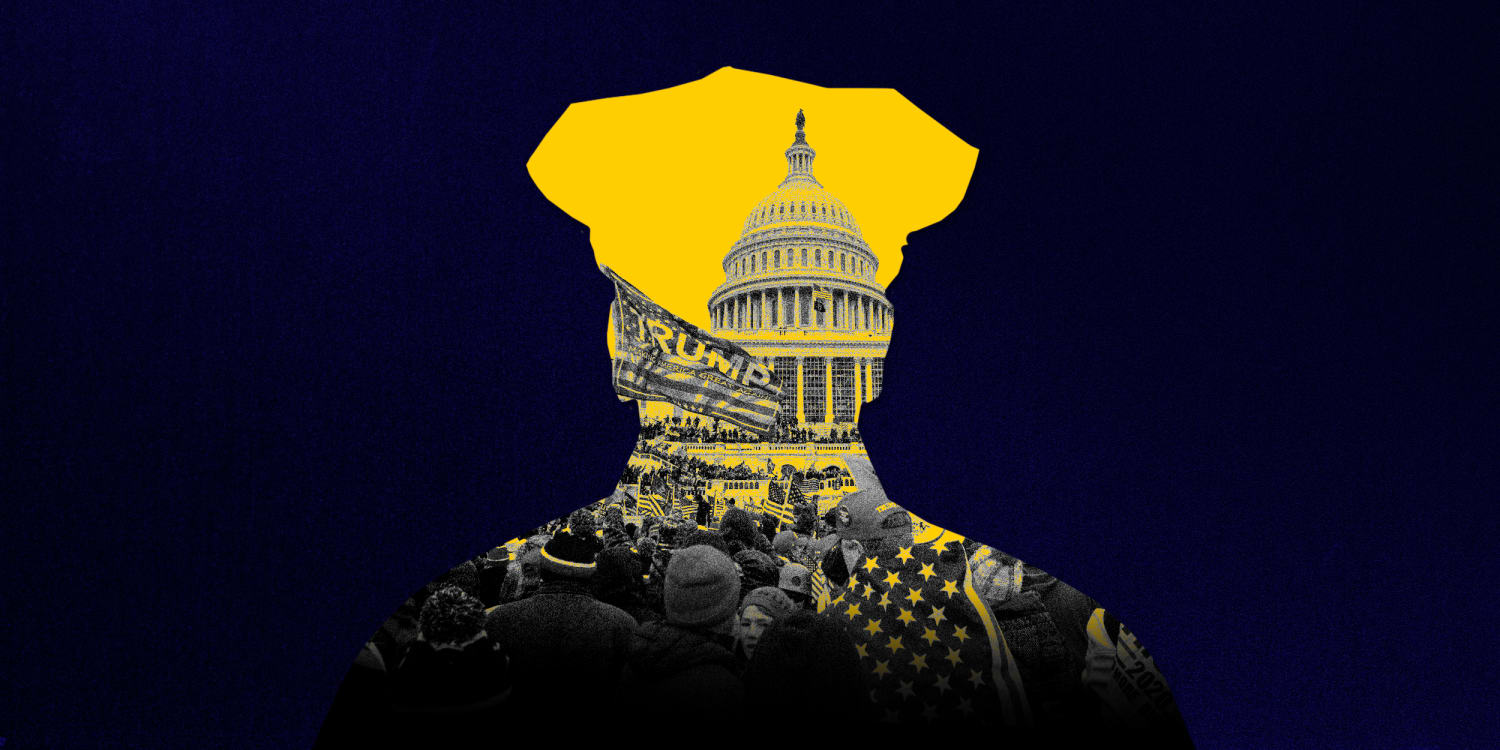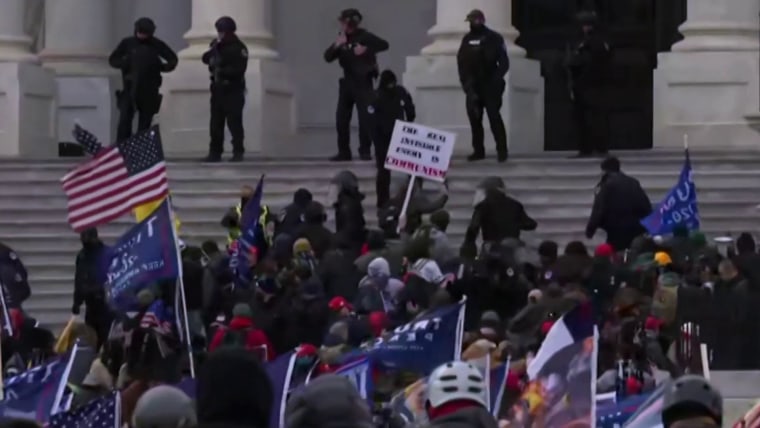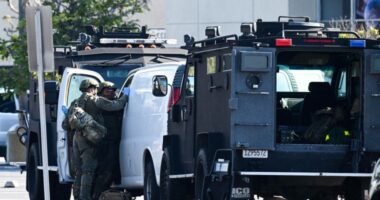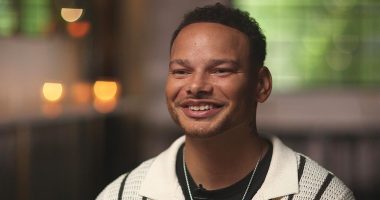Nathan Goodrich, who runs the public defender’s office in Franklin County, Kentucky, was on a Zoom call with court officials Jan. 6 when one of them flagged a Facebook post from a local narcotics detective who was going to a rally for outgoing President Donald Trump in Washington, D.C.
It was around noon, just before a mob of far-right rioters, including white supremacists and anti-government militia members, broke away from the rally and stormed the U.S. Capitol. Even then, the court officials on the call expressed concern about a local law enforcement officer attending an event supporting Trump’s false claim that the election had been stolen. “You and other defense attorneys are going to have a field day with him,” Goodrich recalled one of the officials telling him.
The detective, a Franklin County sheriff’s deputy named Jeff Farmer, did not join those who attacked the Capitol and has not been charged with a crime. But his participation in Trump’s rally put fresh focus on his work in Franklin County, where Goodrich and his co-workers say Farmer was known for his zealous pursuit of drug offenders.
Farmer, who is white, was popular among law enforcement and residents who’d sought his help with drug activity in their neighborhoods. But Goodrich and a local civil rights group knew his name because some of those Farmer arrested in recent years, including about half a dozen clients of the public defender’s office, claimed in court filings that he had improperly searched them, used excessive force or targeted them because they were Black.
The civil rights group, Focus on Race Relations: Frankfort, had shared Black residents’ concerns about Farmer with Sheriff Chris Quire last summer. Little had come of it: Many of the complaints were informal, and of the allegations that were raised in court, most had been dismissed by judges or abandoned when defendants agreed to plea deals.
But that changed Jan. 6, with Farmer suddenly in the spotlight. A public outcry led Quire to launch an investigation into Farmer’s participation in the rally and the previous complaints against him, which prompted a furious response from the deputy’s supporters. The debate has split a community already divided over Trump, the election results and the public’s trust in law enforcement.
The sheriff’s office has been barraged with messages — both complaints about Farmer and praise for him.
“Half of the county is against him, half of the county is for him,” said Capt. Daniel Wills, a spokesman for the department, who defended Farmer’s work ethic and said he has “done a tremendous job.”
Farmer declined to comment.
The conflict in Franklin County has been repeated across the country over the past month, as communities learn that local police officers traveled to Washington for the Trump demonstration. Some, including officers from Houston and Rocky Mount, Virginia, were accused of joining the Capitol riot and now face criminal charges.
But more than two dozen other police officers have said they attended the rally but did not join in the violence that followed. In addition to Farmer, the list includes a Kentucky state trooper, a police chief in New Hampshire, five Seattle officers and seven members of Philadelphia’s public transit police agency. Officers and their supporters say they were exercising their First Amendment rights.
While the officers have not been accused of breaking any laws, several agencies have launched internal investigations into possible violations of their codes of conduct. They also want to understand what drew the officers to the rally, which was timed to coincide with Congress’ certifying the election results and followed weeks of online mobilizing by extremist groups calling for an occupation of the Capitol.
“The march was based on a lie — ’stop the steal,’ the election was stolen,” Goodrich said. “So much of Deputy Farmer’s work as a detective is determining when people are telling the truth and lying to him. It raises questions about his ability to do his job as a detective when he’s engaged in a rally in support of a belief that so many members of the community believe is utterly without support.”
A trip to the rally
There was nothing secret about Farmer’s participation in the Jan. 6 rally. He documented his arrival with friends on Facebook, and after the siege wrote a post in which he called the rioters “idiots” and questioned whether they were really Trump supporters. (Farmer’s Facebook page has been deleted, but screenshots of the post were provided to NBC News by people who were friends with him on the site.)
The next day, on the drive back to Kentucky, Farmer got on a video call with a reporter from the local NBC affiliate in Lexington. Wearing a hoodie with a Fraternal Order of Police logo, Farmer said he’d gone to Washington to celebrate Trump’s four years in office.
In the courthouse and in neighborhoods with high drug traffic, Farmer is a familiar presence, welcomed by some and feared by others. People who have called the sheriff’s office to report drug activity and got a response from Farmer say he is relentless in his pursuit of the bottom- and mid-rung players in the local narcotics economy. Some of those who become his target say he often goes too far, using questionable reasons to stop, search and charge them — although the sheriff’s office says it has no record of formal complaints lodged against Farmer. His world is a tiny slice of America’s never-ending war on drugs.
For more of NBC News’ in-depth reporting, download the NBC News app
Franklin County is the home of Frankfort, the state capital, and Kentucky State University, a historically Black institution; residents say it has a small-town feel. About 50,000 people live in the county, 82 percent of them white and about 9 percent Black. Registered Democrats outnumber registered Republicans 2-to-1 — an anomaly in deeply red Kentucky — but Trump carried the county in November by 248 votes.
Because Frankfort is the seat of state power, it was the site of a number of emotionally charged protests in 2020, from Black Lives Matter marches in response to the killing of Breonna Taylor in a botched police raid in Louisville to conservative demonstrations against coronavirus lockdown orders. Partisan animosity over Trump’s election loss and his fraud allegation linger.
Talking over FaceTime in the back seat of a friend’s car Jan. 7, Farmer didn’t exactly say whether he believed Trump’s claim that the election was stolen. But he told the reporter that he didn’t “realistically” think the results would be overturned, and that he hadn’t expected violence, according to video of the interview provided by the affiliate, WLEX. He said he joined the rally to be present at something historic, and to people-watch.
“We kind of just wanted to see what would happen, and we knew that this would probably never happen again, that type of rally to support a president that’s going out,” Farmer said. “And, you know, there’s millions of Americans that think the election wasn’t exactly fair, you know, and there’s a lot of voting discrepancies and things like that and it’s just something we wanted to take part in and just see.”
Farmer said the “extremists” and “weak-minded” people who rioted had darkened an otherwise peaceful rally. He called the siege “embarrassing” and “disgraceful” and said he did not want to be identified with it.
But it was too late for that.
Old complaints get new life
Last summer, after the police killing of George Floyd sparked a national debate about race and policing, Focus on Race Relations: Frankfort began asking residents if they had problems with any local officers. Farmer’s name came up repeatedly, members said.
In late August, leaders of the group met in person with Quire, the sheriff, and told him that they’d heard stories about Farmer harassing people, using excessive force, racial profiling and not wearing a body camera, said Kristie Powe, the group’s president. The activists didn’t share the names of the people who’d complained, or when the run-ins with Farmer happened. They also mentioned Facebook posts in which Farmer allegedly had condemned a local school’s plans to assign a novel that discussed racism in law enforcement.
“I just wanted to know the facts, what is being done, and do you recognize this as an issue,” Powe, who is Black, recalled of the meeting with Quire. “I want to be fair, as well. I don’t know Farmer, I’m not trying to ruin his life. My concern is for the Black people in this community. There are problems that people are reporting and I want to make sure those are being addressed.”
Quire is an elected Democrat who, like 37 of his 40 deputies, is white. At the meeting, he said he was familiar with one of the complaints, in which a person claimed Farmer pulled a gun on them in a situation that didn’t call for it, according to Margaret O’Donnell, a Focus on Race Relations: Frankfort member who attended the meeting. He thanked the activists for sharing their concerns, she said.
The activists said they heard little about Farmer after that — until Jan. 6.
Farmer’s critics say the detective should have known what the Jan. 6 rally represented, the rhetoric that would be voiced, and that extremists would be among the crowd.
Powe said his participation in the rally “was adding more fuel to fire to what we felt we were experiencing with Farmer, and we wanted to know if something was going to be done.”
Her group met with Goodrich, the public defender, and told him about the August meeting with Quire. Goodrich’s team compiled a handful of cases in which Black clients accused Farmer of misconduct.
The cases included a man facing charges for allegedly smoking marijuana in a parked car in 2019, who accused Farmer of jumping out, pointing a gun in his face and threatening to shoot him — allegations that a judge ultimately dismissed. Another man, arrested by Farmer on gun charges in 2019, accused the detective of making false statements in his application for a search warrant; those claims were also dismissed by a judge.
Another man who has been stopped or arrested by Farmer multiple times said in an interview with NBC News that the detective had searched cars without probable cause, seized his phones and harassed him in public. The man, 26, who did not want to be identified by name out of fear of retribution, said he felt forced to plead guilty to low-level marijuana charges and became convinced Farmer was following him.
“He targets you unfairly when you’re going about your lawful business and you can’t shake him off your back,” the man said.
On Jan. 8, Goodrich and his colleagues sent a letter to Quire, asking him to investigate Farmer’s activities at the rally, and cases “which reflect targeting and racial profiling.”
The letter also mentioned that Farmer had resigned from the nearby Versailles Police Department in 2011 after coming under investigation for misconduct. Farmer’s letter of resignation, obtained by the public defender’s office through a public records request and shared with NBC News, details the accusations, including lying to a commander and having someone under criminal indictment to his house for a birthday party.
“We will no longer silently stand by and allow Deputy Farmer to stain the reputation of Franklin County and cripple the individual lives who we represent,” the lawyers wrote.
Quire considered the allegations for a few days, then released a statement supporting Farmer’s First Amendment right to attend the rally and saying there was no evidence that he had broken any laws. But Quire also announced an investigation into the complaints against Farmer, and his presence at the rally, and reassigned him from narcotics duty.
Reached by email, Farmer declined to comment, but said his lawyers would speak on his behalf once the investigation, conducted by a former FBI agent, ended.
Wills, the sheriff’s office spokesman, defended Farmer, who won the agency’s Deputy of the Year award in 2015 and 2019 and won a public poll that named him Frankfort’s “Favorite Law Enforcement Officer” in 2018.
The honors, Wills said, reflected “the cases he worked, his work ethic, that he’s always willing to help people in the public, along with the deputies he works with.”
Wills said Farmer’s reassignment to desk duty was not a punishment but a move to keep him safe while the investigation was underway.
“He’s got a target on his back, and we can’t put him out there when so many people are against him,” Wills said.
‘One of the best narcotics detectives’
The investigation was welcomed by some in Franklin County, but it angered Farmer’s supporters, who believed he had done nothing wrong in Washington and was targeted because he was such an effective narcotics investigator.
“When he came back from the rally, all the people that had grudges against him just got louder, just smelled blood in the water, and started attacking him, whether it had a credible basis or not,” Gerald Hedrick said.
Hedrick, 51, who is white, said he has relied on Farmer to curb drug traffic in his neighborhood in Frankfort’s Thornhill section, where he lives with his wife, four adopted children and two foster children. Hedrick recalled texting photos of drug activity to Farmer, who would target people for arrest.
“He just delivers,” Hedrick said. “Helping us try to get these people out of our neighborhoods is what he seems to thrive on.”
Tammy Ricketts was so irked by the hubbub over Farmer that she wrote a letter to the local newspaper praising him. In an interview, Ricketts, 53, said she speaks from experience because Farmer has arrested her son, a recovering addict, many times.
“That tells me he’s doing his job,” Ricketts, who is white, said. “He’s been one of the best narcotics detectives in this town in a mighty long time.”
Larry Cleveland, Franklin County’s elected lead prosecutor, knows Farmer well and respects his work. Cleveland is a Democrat and does not support Trump. He said he wished Farmer didn’t go to the rally. But he also said the detective did nothing wrong in doing so.
“Jeff Farmer is just a blue-collar good ol’ boy and going to this for him was like going to see Willie Nelson,” Cleveland said. “I don’t think he had any malicious or bad intent of any sort and I don’t think had any thought of anything bad happening as a result of him going.”
Cleveland also said he had never witnessed any of the misconduct alleged by the public defender’s office: “He’s been very effective as a narcotics officer and the criminal defense attorneys want to get rid of him. Like taking the star player out of the game.”
Unanswered questions
Franklin County is now waiting for the results of Quire’s independent investigation. Goodrich, whose letter prompted it, said he doesn’t expect the findings to change many minds — about Farmer, about Trump or about law enforcement. If anything, he said, the process so far has reinforced people’s views.
“If you wave the Blue Lives Matter flag, you believe we’re stomping on his First Amendment rights, and if you believe there is an issue with race and policing in America, we said what you think needed to be said,” Goodrich said.
But he said that something crucial has already happened: a community debate about the intersection of policing, race, politics and fairness.
“In our small-town way, this issue has made Franklin County think about these things when perhaps we hadn’t,” Goodrich said. “Maybe for too long we’ve been a place where everybody knows everybody and we haven’t had hard conversations about race and policing.”
Source: | This article originally belongs to Nbcnews.com















